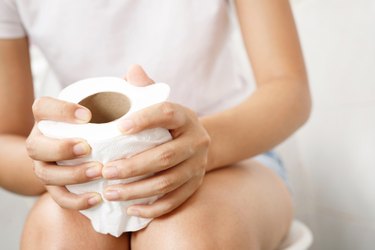
While the list of ways exercise benefits your body is long, there are some occasions when hitting the gym can do more harm than good. Exercise plays an important role in digestive health, but if you have diarrhea, it's best to take a day (or a few) off from working out until you're better.
"If you have diarrhea, exercising is likely to exacerbate the problem," says Maria T. Abreu, MD, director of the Crohn's and Colitis Center at the University of Miami Miller School of Medicine in Florida. "There's no situation in which it will help stop diarrhea."
Video of the Day
Video of the Day
How Working Out Affects Digestion
To understand why exercise — aerobic exercise, specifically — can worsen diarrhea, it's important to first understand how it benefits your digestive health. The primary way it does this is by increasing what's called gastric motility, which refers to the movement of food through your gastrointestinal (GI) tract.
"In this way, aerobic exercise helps ensure you have regular bowel movements," Dr. Abreu says. "Part of the reason we know this is because people who have a sedentary lifestyle tend to develop constipation because their gastric motility is decreased."
Normally, that increase in gastric motility is welcome. But because a common cause of diarrhea — defined as having loose, watery stools three or more times a day, according to the National Institute of Diabetes and Digestive and Kidney Diseases (NIDDK) — is excessively rapid transit of fecal matter through your GI tract, a boost in gastric motility can make your condition worse, Dr. Abreu explains.
Related Reading
The Risks of Exercising With Diarrhea
If you've been experiencing loose, watery stools, chances are the associated fatigue and stomach cramps will prevent you from making it to the gym. But even if you somehow do find the energy to work out, it might not be safe to do so.
The main concern, Dr. Abreu says, is dehydration, which is a major complication of diarrhea. When you lose more fluid than you're able to take in — a common occurrence when your stools are loose and watery — your body may not be able to carry out its normal functions.
"If you're already dehydrated from having diarrhea, exercising is not a good idea because you'll end up losing even more fluid through sweating," she explains.
Signs that you're dehydrated, according to the Mayo Clinic, include extreme thirst, less frequent urination, dark urine, confusion, fatigue and dizziness. Severe cases of diarrhea can lead to seizures and low blood volume shock (hypovolemic shock), a condition that occurs when low blood volume causes your blood pressure and the amount of oxygen in your body to drop. Hypovolemic shock can be life-threatening.
To treat dehydration, get plenty of water as well as liquids that contain electrolytes, such as broths, fruit juices and caffeine-free soft drinks and sports drinks, according to the NIDDK.
But keep in mind some people may want to avoid the sweeter options, Dr. Abreu says: "The most common food intolerance after lactose intolerance is fructose malabsorption, which can cause diarrhea," she says. "If fructose bothers your stomach, it's better to drink Pedialyte (Amazon.com, $23.92 for four 1-liter bottles), which is lower in fructose."
The Takeaway
If you've been experiencing diarrhea, it's best to rest until you're feeling better. Ideally, your bowel movements should be back to normal before you exercise, but it's just as important that your urine has returned to a pale yellow color — a sign that you're no longer dehydrated, Dr. Abreu says.
A bout of diarrhea is usually short, but if it persists for more than a few days, that's a sign you should see a doctor. Others include dehydration, severe abdominal or rectal pain, bloody or black stools and a fever above 102 degrees Fahrenheit (39 degrees Celsius), according to the Mayo Clinic.
Related Reading
- Maria T. Abreu, MD, director, Crohn’s and Colitis Center, University of Miami Miller School of Medicine, Florida
- National Institute of Diabetes and Digestive and Kidney Diseases: “Diarrhea”
- National Institute of Diabetes and Digestive and Kidney Diseases: “Diarrhea Treatment”
- Mayo Clinic: “Diarrhea”
- Mayo Clinic: “Dehydration”
Is this an emergency? If you are experiencing serious medical symptoms, please see the National Library of Medicine’s list of signs you need emergency medical attention or call 911.